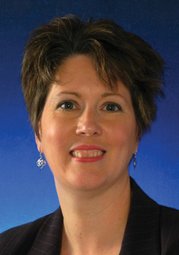SPECIAL SECTION
2017 AIHA ELECTIONS
Kathy Murphy, CIH
Global Director, Regulatory Affairs
The Sherwin-Williams Company
Cleveland, Ohio
I found my way into industrial hygiene mostly by chance, but it has been a fantastic 25-plus years since then. But building a pipeline begins with an awareness of who we are and what we do. Every industrial hygienist I know is passionate about protecting worker health. Many are also involved in protecting health for consumers or the public. The next generation of professionals is similarly motivated to make this world a better place.
Awareness needs to start in high school so that we can recruit more students to study IH or related subjects in college. Funding scholarships and promoting internships helps them understand you can support yourself and make a difference.
AIHA needs to continue to build on our early career support offerings, which include mentoring, reduced membership fees, and the Future Leaders Institute. We all have stories to share about our successes and the wide variety of industrial hygiene jobs that can lead to a career rather than just a paycheck. Social media is a great way to spread the message—after we have built the right content.
Pipelines are also built through strong relationships, which are developed through vibrant local sections, attendance at conferences, or being invited to join a committee. Let’s work together to make sure that our new members feel welcome in the AIHA family.
VICE PRESIDENT

Harry Beaulieu, PhD, CIH, CSP, FAIHA
President
Industrial Hygiene Resources, Ltd.
Boise, Idaho
We all need to increase awareness and promote industrial hygiene to early career professionals. This should start with college-bound students interested in science and healthcare, and continue with young professionals in ancillary fields. A factor that may affect their choice for a career path is an understanding of our core value of protecting worker health, and that sense of satisfaction gained from improving people’s lives.
Our profession still needs to be firmly based in science and technology. Product stewards are an example of ancillary professionals who may be interested in our field, and we should continue our efforts to make a professional home for them. We need to help them become proficient in our core rubrics. For example, product stewards may need training in a specific rubric such as ventilation, and they may embrace the opportunity to complement their knowledge base.
We should listen to these young professionals through their means of communication, foster interaction with experienced industrial hygienists, and change our association models to ensure that they will receive value for this interaction. We should embrace social media and mentoring efforts. The networking and fellowship opportunities can spark interest in younger professionals, and we need to promote this while still being respectful of their time.
thesynergist | TOC | NEWSWATCH | DEPARTMENTS | COMMUNITY

